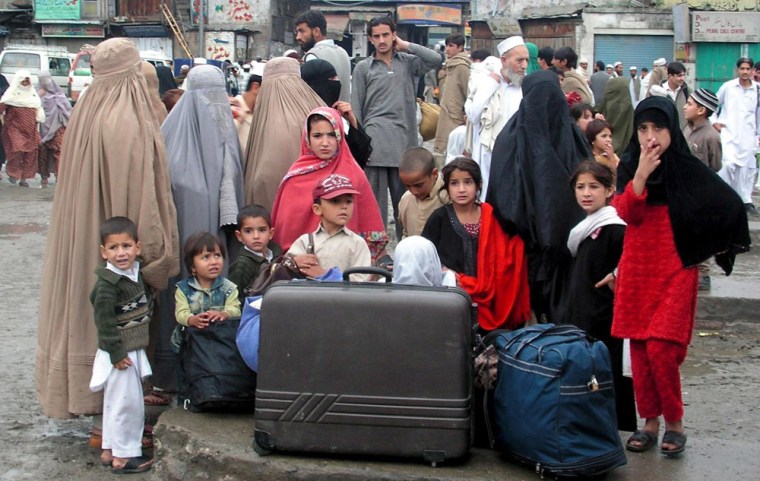The Pakistani teenager remembered recognizing her distant relative almost instantly, even though his head had been severed and placed on his back, punishment the Taliban claimed was for spying.
The brutal discovery was just one example used Tuesday by Kulsoom, a 16-year-old refugee, to describe life in the Swat Valley under Taliban control. As tens of thousands flood refugee camps to escape fighting between the army and militants, some are cautiously sharing their stories, detailing how extremists ran roughshod over cities and hamlets.
The Taliban's brand of Islamic law proved too harsh for many residents in the relatively conservative region of Pakistan, and it appears to be a major reason large numbers of the displaced support the military's latest offensive in the area.
Kulsoom, who comes from Swat's main city of Mingora and gave just one name to protect her identity, said she quit a housekeeping job that helped support her family because of growing Taliban restrictions on womens' movements.
She said she was stopped on the street while wearing a regular veil and warned by Taliban fighters to wear an all-encompassing burqa instead. Then, there was the sickening moment a few months ago when she and friends found the body of her distant relative.
"All I could think was that I missed the old days when we were happy," said Kulsoom, radiating a cheerful fatalism in a camp of several hundred families in this village south of the fighting.
As her mother warned her to not say too much, the young girl, first declared, "I'm not scared of them!" then later begged for details about her to be limited for fear she would be identified.
Two years into the Taliban
Swat was once a popular tourist haven known as the "Switzerland of Pakistan" for its Alpine scenery. It began falling prey to the Taliban — many of them locals who signed on to support a radical Islamist called Maulana Fazlullah — about two years ago.
Sporadic military offensives and peace deals failed to push the militants out, leading the Pakistani army — under pressure from the U.S. — to last week launch what it described as a decisive operation against the militants in the valley.
The operation there and in surrounding areas has displaced some 800,000 people, including 501,000 registered by the U.N. Pakistan's army said that offensives in the northwest, including ones before the most recent operation, have displaced 1.3 million people in the country of 170 million.
The U.S. has praised Pakistan's latest offensive, saying Islamabad must eliminate safe havens used by militants to undermine the pro-Western governments in both Afghanistan and Pakistan.
Swat is considered a key test partly because, unlike Pakistan's semiautonomous tribal regions, the valley is supposed to be under full government control. Yet, a few thousand militants have managed to hold hostage a one-time population of 1.5 million using fear.
In Mingora, a major intersection called Green Chowk is now known as Khooni Chowk — Bloody Intersection — because beheaded bodies, two or three at time, would appear there day after day. Notes attached to the victims accuse them of being spies or criminals, and warning people to not remove the bodies until a designated time.
Mullah promised quicker justice
To gain support, Fazlullah — nicknamed Mullah Radio due to his use of the airwaves — exploited a local grievance over the slow, corrupt judicial system by agitating for special Islamic courts. But soon, his supporters were burning girls schools, and threatening those carrying out activities they considered un-Islamic.
That included the billiards game of snooker, which meant Shaheen Bibi's husband had to close his little business.
"We are worried," the 30-year-old said, her body sore after sleeping on the ground in a camp in Mardan. "We have left full houses. We left with nothing."
Rima, a 20-year-old who like many Swat residents goes by one name, was always afraid because her husband was a police officer, a group targeted by the militants.
"Whenever I heard the news that they'd beheaded a policeman, I'd worry about my husband," she said, as she nursed her baby in a boiling hot tent. "It was a nightmare for me."
Many residents were too fearful to say much, amid worries that some Taliban sympathizers or relatives of militants were in the camps. Some said the most the militants did in their areas was knock on doors and ask people to go pray.
Had to avoid offending Taliban
Others said they never had violent run-ins with the militants, but had to adjust their lifestyles to avoid offending Taliban supporters in their neighborhoods.
Fazal Rahman, 35, said he made sure his pants were hemmed significantly above his ankles — a style that some religious Muslims consider a mark of piety.
He refused to grow a beard, despite Taliban admonitions, but had to shave at home — the militants forbid barbershops from offering the service.
The government machinery was so helpless, "there were no police even for traffic duty," he said.
For Kulsoom, like nearly all the displaced Pakistanis interviewed, home beckons and she hopes to return soon. But she's willing to wait until she can leave her house without fear.
After all, she asked, "Who's happy being confined to a room?"
